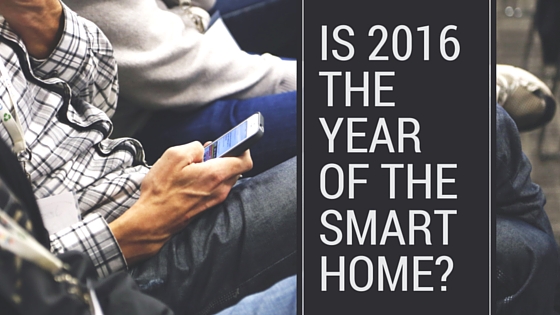
Smart homes in the La Jolla real estate market are part of an emerging trend that is growing in popularity. This week, survey findings were released that suggest that the smart home may go mainstream four years earlier than anticipated. The survey polled 4,000 Americans and found that 45 percent of them already own smart home technology or will invest in it by 2016. The group polled consisted of a mix of those who consider themselves “early adopters” and those that aren’t as likely to purchase new technology the minute it hits stores. Of the latter, more than a third stated that they planned to purchase smart home technology this year.
Consumers are likely to make their first smart home technology purchases in 2016
Network World published a story that cited the study’s finding that 27 percent of respondents who don’t currently own any smart home technology planned to purchase such products this year. That’s a substantial number, but it’s just one of the noteworthy statistics available on the matter.
Smart entertainment, security and temperature technologies are the most popular
The survey also found that entertainment technology, such as smart televisions and surround sound systems, make up 44 percent of smart home purchases already made by survey respondents. Smart security and temperature systems are right behind entertainment purchases, with 31 and 30 percent of respondents stating that they already owned such products.
Network World published another piece on the topic, which suggests that smart appliances are not as popular as smart security and smart temperature technology. However, some integrated devices appear to be getting positive reviews. The article cited Amazon’s Dash, a device that can be fixed to an appliance to order related supplies directly from Amazon when stores are low. The example the author provided was to fix Amazon’s Dash to a washing machine so that laundry detergent can be reordered with one convenient button push.
Network World's coverage of the topic included a different study that indicates that a large number of consumers are using mobile devices to interact with their homes. The article cited an Adobe Digital Trends Report that found that “51 percent of smartphone owners have interacted with a home Internet of Things (IoT) device.” In addition, the survey found that the most popular home IoT devices are connected smoke detectors and Internet enabled thermostats.
Smart home technology appeals to consumers in different cohorts and markets
Luxury Daily also took stock of recent survey findings. They noted that it’s not just Millennials that are purchasing smart home technology. Interest is coming from all age groups and is present in both the luxury and mid-markets, but expectations for a luxury home’s smart features may differ from those found in homes belonging to other market segments.
Smart homes versus homes with smart features
Where is the line that distinguishes a smart home from a home with smart upgrades? Luxury Daily noted that 60 percent of survey respondents believed that a home must possess features in three separate categories to be considered a smart home, and not just a home with some smart features. This distinction is important because the survey found that more than 50 percent of sellers are willing to purchase smart home upgrades and features to make their listings more attractive to buyers. Luxury Daily reported that the following technologies are what constituted a “smart home” to survey participants:
- Security locks and alarms
- Temperature control
- Lighting systems
- Safety features
Luxury brands have taken note of this emerging trend. Luxury Daily described several smart home features that luxury brands have released in an effort to appeal to high-end buyers, including convection ovens that are connected to each other and controlled via mobile devices. In addition, Tesla developed a technology that connects an owner’s car and home. The article also stated that environmentally friendly homes are gaining popularity. There are a number of smart features that serve this market as well, which could very well help the trend to gain more prominence. Given its position as one of the top 20 luxury markets in the country, smart homes in the La Jolla real estate market are more likely to possess features such as the above mentioned.
This year may or may not be the year of the smart home. If 2016 isn't the year smart homes go mainstream, their moment appears to be right around the corner, when before it seemed to be in the distant future. Smart homes in La Jolla are not only ahead of the trend, but also part of one of the top luxury markets in America, which furthers their appeal.
For more information about smart homes in La Jolla visit our La Jolla real estate page or contact DeSouza Select Properties.
Posted by Dennis DeSouza on
Leave A Comment